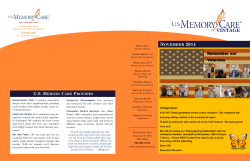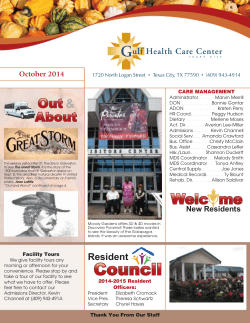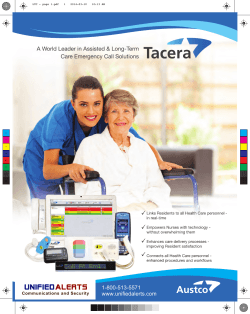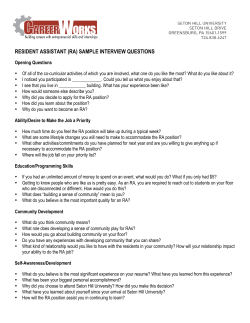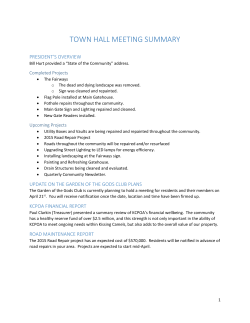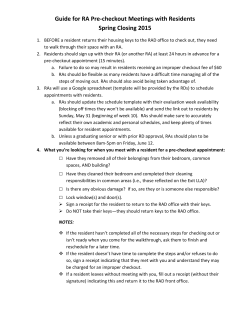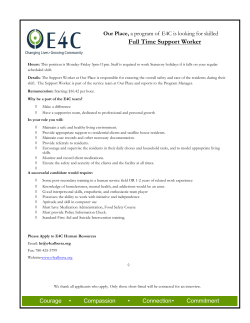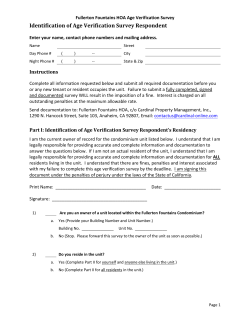
Family Council Recognition in Nursing Facilities
TA BRIEF: TECHNICAL ASSISTANCE FOR LTC Consumers and Family Members FAMILY COUNCIL RECOGNITION IN LONG-TERM CARE FACILITIES I SSUE : Family members in a nursing home can join together to form a united consumer voice which can communicate concerns to facility administrators and work for resolutions and improvements by forming a family council. Family councils can play a crucial role in voicing concerns, requesting improvements, supporting new family members and residents, and supporting facility efforts to make care and life in the facility the best it can be. Facilities are required by law to listen to the views and act upon the grievances and recommendations of residents and families concerning proposed policy and operational decisions affecting resident care and life in the facility. Q UESTION : Can a ‘family council’ be properly constituted which allows family members only five minutes to speak and then requires that they leave and not participate in the remainder of meetings; and which meetings are attended by facility staff members? In effect, does such a body fulfill family-council requirements and further does it address the intended purpose of family councils? R ESPONSE : The Nursing Home Reform Act of 1987 guarantees the families of nursing home residents a number of important rights to enhance a loved one’s nursing home experience and improve facility-wide services and conditions. It includes the following requirements on family councils:1 A resident’s family has the right to meet in the facility with the families of other residents in the facility. The facility must provide a family group, if one exists, with private space. Staff or visitors may attend meetings at the group’s invitation. The facility must provide a designated staff person responsible for providing assistance and responding to written requests that result from group meetings. When a family group exists, the facility must listen to the views and act upon the grievances and recommendations of residents and families concerning proposed policy and operational decisions affecting resident care and life in the facility. The Centers for Medicare and Medicaid Services (CMS), which oversees the nursing home survey and certification process, interprets this language in its guidance to surveyors in the following excerpt: This requirement does not require that residents’ organize a residents or family group. However, whenever residents or their families wish to organize, facilities must allow them to do so without interference. The facility must provide the group with space, privacy for meetings, and staff support. Normally, the designated staff person responsible for assistance and liaison between the group and the facility’s administration and any other staff members attend the meeting only if requested. “A resident’s or family group” is defined as a group that meets regularly to: Discuss and offer suggestions about facility policies and procedures affecting residents’ care, treatment, and quality of life; 1 42 CFR sec.483.15(c); Public Law 100-203, Social Security Act Support each other; Plan resident and family activities; Participate in educational activities; or For any other purpose. The facility is required to listen to resident and family group recommendations and grievances. Acting upon these issues does not mean that the facility must accede to all group recommendations, but the facility must seriously consider the group’s recommendations and must attempt to accommodate those recommendations, to the extent practicable, in developing and changing facility policies affecting resident care and life in the facility. The facility should communicate its decisions to the resident and/or family group. 2 In essence, facilities certified for Medicare and Medicaid must provide a meeting space, cooperate with the council’s activities and respond to the group’s concerns. Nursing facilities must appoint a staff advisor or liaison to the family council, but staff and administrators have access to council meetings only by invitation. While the federal law specifically references “families” of residents, it is our opinion that close friends of residents can and should be encouraged to play an active role in family councils, too. Also, there is no language in the federal law that specifically prohibits the formation of more than one family or resident council in a single facility. R ESOURCES : Family Council Brochure Why Family Led Family Councils Benefit Residents Family Members and Facility Staff The Rights of Family Councils in Nursing Homes C ONTACT U S : If you have questions about this brief or would like to share some of your Family Council’s activities or challenges regarding Family Councils please email amurphy@theconsumervoice.org or call 202-332-2275. 2 State Operations Manual Appendix PP - Guidance to Surveyors for Long Term Care Facilities; F244; Interpretive Guidelines §483.15(c)
© Copyright 2025


